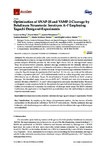Optimization of SNAP-25 and VAMP-2 Cleavage by Botulinum Neurotoxin Serotypes A–F Employing Taguchi Design-of-Experiments
von Berg, Laura
Stern, Daniel
Weisemann, Jasmin
Rummel, Andreas
Dorner, Martin Bernhard
Dorner, Brigitte Gertrud
The detection of catalytically active botulinum neurotoxins (BoNTs) can be achieved by monitoring the enzymatic cleavage of soluble NSF (N-ethylmaleimide-sensitive-factor) attachment protein receptor (SNARE) proteins by the toxins’ light chains (LC) in cleavage-based assays. Thus, for sensitive BoNT detection, optimal cleavage conditions for the clinically relevant A–F serotypes are required. Until now, a systematic evaluation of cleavage conditions for the different BoNT serotypes is still lacking. To address this issue, we optimized cleavage conditions for BoNT/A–F using the Taguchi design-of-experiments (DoE) method. To this aim, we analyzed the influence of buffer composition (pH, Zn2+, DTT (dithiothreitol), NaCl) as well as frequently used additives (BSA (bovine serum albumin), Tween 20, trimethylamine N-oxide (TMAO)) on BoNT substrate cleavage. We identified major critical factors (DTT, Zn2+, TMAO) and were able to increase the catalytic efficiency of BoNT/B, C, E, and F when compared to previously described buffers. Moreover, we designed a single consensus buffer for the optimal cleavage of all tested serotypes. Our optimized buffers are instrumental to increase the sensitivity of cleavage-based assays for BoNT detection. Furthermore, the application of the Taguchi DoE approach shows how the method helps to rationally improve enzymatic assays.
Dateien zu dieser Publikation

